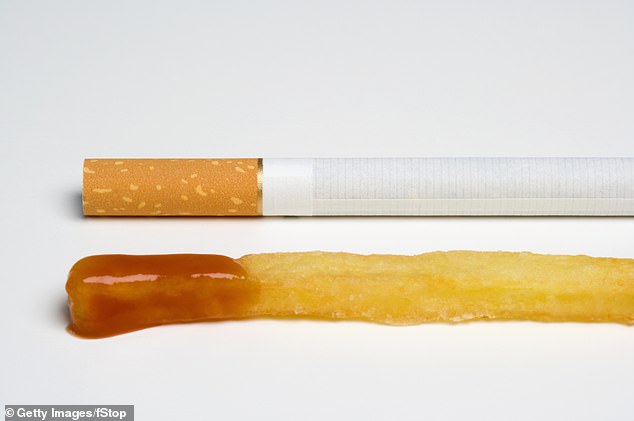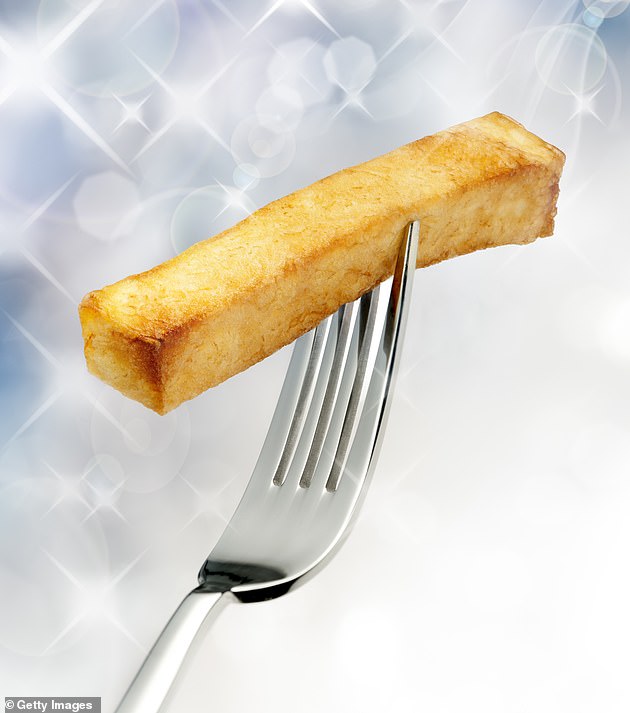Subsequent time you go to the grocery store, learn the components lists. In nearly each aisle, from dairy to frozen meals and snacks, you will notice vegetable oils making repeated appearances on many product labels, together with salad dressings, canned fish, ready-to-eat meals, eating regimen drinks and toddler formulation.
These oils, often comprised of seeds, embody sunflower, corn, rapeseed, soy, cottonseed and safflower oils.
Vegetable oil is a world trade. It generated greater than £91 billion in 2020, and that determine is forecast to extend to £127 billion by 2027.
Roughly a 3rd of the energy in your eating regimen probably comes from this substance, which has results on our metabolism that medical science is aware of little about. The rationale why human well being is more and more in disaster is true there on the label, hidden in plain sight.
I am a health care provider with biochemistry coaching who specialises in household medication, and I’m satisfied that these oils will make you sick (in the event that they have not already).

The quantity of cancer-causing toxins present in a serving of French fries is equal to these consumed when smoking as much as 25 cigarettes. (A 5oz serving has about 25 fries, so consuming one chip provides the identical publicity as smoking one cigarette)
The hyperlink between vegetable oil and poor well being is firmly grounded and backed up with laborious scientific analysis. Eradicating it from our diets can resolve fast-proliferating trendy well being plagues, reminiscent of cancers, Alzheimer’s and Parkinson’s illness.
Vegetable oil is an industrial product that did not exist till a little bit greater than 150 years in the past. Within the millennia earlier than industrial agriculture modified our panorama, many human populations relied on animal fat reminiscent of butter, beef fats and pork fats.
Humanity has been consuming animal fat for the reason that Stone Age, and dairy fats for practically 10,000 years. We have additionally eaten oils extracted from fatty fruits reminiscent of olives and coconuts for a lot of 1000’s of years.
However vegetable oils are radically totally different. Making them requires technologically superior gear slightly than a easy stone press, butter churn or butcher’s knife.
But regardless of the complexity of processing these merchandise, they’re now the biggest single supply of dietary fat, accounting for extra energy in our diets than sugar or flour.
Heating oils creates toxins
A fundamental downside with these oils is that they’re very excessive in polyunsaturated fatty acids (PUFA). These compounds are very liable to reacting with oxygen — a course of known as oxidation.
This oil oxidation creates new compounds known as, collectively, lipid oxidation merchandise (LOPs).
LOPs do not exist within the crops these merchandise got here from — and lots of are mildly to extraordinarily poisonous. By consuming these oils we’re exposing our our bodies to a whole lot, even 1000’s, of various kinds of poisonous LOPs.
A few of these have been nearly unknown till just lately, after they have been recognized because of new applied sciences.
These poisonous LOPs are fashioned when the oil is extracted throughout its manufacture.
Nonetheless extra poisonous LOPs can kind in oil throughout storage, because the oil oxidises (breaks down) over time.
Toxicologists who carry out real-world assessments on vegetable oils in individuals’s properties and eating places discover that even earlier than cooking, the oils comprise considerably increased concentrations of poisons than after they have been first bottled.
Much more toxins kind when the oil is heated to make meals, whether or not in our properties, in eating places, or in processed-food factories.
And but extra toxins will kind if the meals will get heated once more, as in when leftovers are warmed up. There are volumes of educational textbooks that describe all of the toxins you expose your self to from consuming meals made with vegetable oils.
But few individuals ever learn these books or be taught in regards to the damning data they comprise.
Not all are poisonous if heated
Martin Grootveld, a professor of bioanalytical chemistry and chemical pathology at De Montfort College in Leicester, has been attempting to warn shoppers about toxins in vegetable oils for many years.
He research oxidation reactions utilizing the very best instrument for analysing an array of molecules : a one and two-dimensional nuclear magnetic resonance (NMR) spectroscope. This machine can decide the make-up of a molecule by inspecting how its atoms spin when inside a magnetic area.
The toxins he has recognized in vegetable oils embody acrolein. This inflames lungs when inhaled, which we might do when frying with these oils. He has additionally discovered many members of a toxin class known as epoxy fatty acids. These are implicated in breast most cancers, organ failure and fertility issues.
Professor Grootveld’s analyses constantly present that heated vegetable oils are loaded with poisonous LOPs.
Against this, his experiments with heated coconut oil and butter discover that they comprise hardly any toxins in any respect.
Nevertheless, such is the medical ignorance of those risks that after I requested Professor Grootveld if he’d ever been invited to current his information at a medical convention, he informed me he had not.
What’s in these fries?
Aldehydes are maybe probably the most harmful class of the various households of poisons in vegetable oils. This household of chemical substances contains the cadaver preservative formaldehyde and most of the toxins that make cigarette smoke carcinogenic and aggravating to human tissue.
Poisonous aldehydes that kind in frying oil can find yourself within the meals.
In 2019, Professor Grootveld led analysis, printed within the prestigious journal Nature, which discovered {that a} 5oz serving of French fries cooked in vegetable oil (from a well known franchise) contained 25 instances extra carcinogenic aldehydes than the World Well being Organisation’s tolerable higher restrict for publicity.
Professor Grootveld informed me that the quantity of cancer-causing aldehydes he discovered within the serving of French fries is equal to these consumed when smoking as much as 25 cigarettes. (A 5oz serving has about 25 fries, so consuming one chip provides the identical publicity as smoking one cigarette.)
Deep-frying results in extra toxins
The extent of harm completed to polyunsaturated oils by oxidation follows the identical fundamental rules as burns in your pores and skin: it relies on time and temperature.
Consultants warn that the longer the oil is cooked and the upper the cooking temperature, the extra toxins will kind.
Eric Decker, a professor of meals science on the College of Massachusetts Amherst within the U.S., is among the most extremely cited scientists in agriculture.
He focuses on stopping oxidation in our meals provide, and informed me that in terms of toxin manufacturing, ‘the largest danger issue is deep-frying the oil’.
Deep-frying stresses oils for a very long time at excessive temperatures. Quick-food chains typically have guidelines that inform workers to cut back toxicity by altering the frying oil as soon as every week. Smaller eateries and chains might not.

Roughly a 3rd of the energy in your eating regimen probably comes from vegetable oil, which has results on our metabolism that medical science is aware of little about
…However pan-frying is an in depth second
A report within the American Journal of Epidemiology in 2000 recognized an alarmingly excessive fee of lung most cancers in non-smoking ladies who use vegetable oils throughout pan-frying, deep-frying and stir-frying, each in meals service settings and their very own properties.
Many individuals know deep-frying just isn’t wholesome and keep away from deep-fried meals. That is why Professor Grootveld is extra involved about shallow-frying meals in pans utilizing vegetable oils.
He has printed a number of papers in numerous prestigious journals, together with a 2019 paper in Scientific Studies warning you can generate the identical ‘extraordinarily excessive ranges of hazardous aldehydes’ whereas making standard pan-fried dishes at residence.
So it isn’t nearly deep-fried meals, and it isn’t nearly eating places. This could possibly be occurring in your kitchen.
Physique fats turns into like veg oil
Dr Stephan Guyenet is an unbiased neuroscientist who has investigated what our growing consumption of vegetable oils is doing to our physique fats.
Within the journal Advances in Diet in 2015 he printed a assessment of fifty years of research on the composition of Westerners’ physique fats.
This confirmed that the proportion of polyunsaturated fatty acids in it had progressively elevated from 9.1 per cent of all fatty acids to 21.5 per cent. This was in keeping with growing public consumption of vegetable oils. The lesson was clear: the extra vegetable oil individuals ate, the extra their physique fats began to appear like vegetable oil.
Our reformulated physique fats causes a elementary shift in our physique chemistry. This topics our cells and tissues to a chemical imbalance known as oxidative stress.
Oxidative stress unleashes carcinogenic toxins in cells that may harm proteins and DNA.
Is there a hyperlink to Alzheimer’s?
In 1906, German pathologist Alois Alzheimer examined slices of mind tissue from a lady who died of early-onset dementia. He discovered uncommon clumps of protein, which he known as amyloid plaques.
However the origin of the plaques eluded scientific clarification till U.S. and Japanese researchers reported that these plaques are brought on by oxidative stress, in 2001 within the Journal of Neuropathology and Experimental Neurology. Their analysis confirmed that oxidative stress damages proteins, producing tiny blobs of mobile particles.
Our mind cells have garbage-disposal methods that may clear up most forms of particles. However not all — and never amyloid. The amyloid that the clean-up crew cannot deal with will accumulate throughout the cell, and ultimately it begins forming amyloid plaques.
The accumulating plaque slows down mobile exercise, which slows down the mind’s processing pace — and that is when signs often start.
Many degenerative problems observe an identical development.
One other widespread disease-inducing protein blob is oxidised alpha-synuclein, which causes Parkinson’s illness and Lewy physique dementia (the second commonest dementia, after Alzheimer’s).

A research discovered {that a} 5oz serving of French fries cooked in vegetable oil contained 25 instances extra toxins than the World Well being Organisation’s tolerable higher restrict for publicity
Find out how to de-pufa your physique
Whereas I’ve little question that we will get our PUFA ranges again all the way down to regular, it takes some time. One research, from 1960, confirmed that the half-life of PUFA in our physique fats ranged from 350 to 750 days, which suggests it takes that lengthy to filter simply half of it.
More moderen research, reminiscent of a report within the journal Cell Metabolism in 2011, pinpoint an identical determine: 580 days on common. So we’re three or 4 years of avoiding vegetable oils to normalise the quantity of PUFAs in your physique fats.
Nevertheless, from my expertise with sufferers, the excellent news is that often individuals really feel higher inside a few weeks of chopping out vegetable oils, notably in the event that they endure from persistent ache or abdomen issues, as a result of their our bodies’ irritation ranges can have dropped considerably.
So how are you aware what to search for? Verify the components record of each product that has a vitamin label. Each. Single. One. Since you merely cannot predict what can have vegetable oil in.
You may suppose that dried fruits, for instance, would not, however they do. Or peanut butter. Or nuts, rotisserie rooster, mayonnaise and dressings that say ‘made with olive oil’, granola, canned tuna, olives, sun-dried tomatoes and different vegetable preserves, even random issues reminiscent of nutritional vitamins and spice blends.
Most individuals who shun vegetable oils have a tendency to make use of butter, olive oil and peanut oil. For residence cooking with wholesome oils, that you must select the oil that matches the delicacies.
I take advantage of olive oil for selfmade pasta sauces and something Italian, Mediterranean — and even Mexican (the standard fats could be lard, which I can not simply get). I additionally use it for roasting greens and making dressings, marinades and mayonnaise. In case you wish to make Thai and Indian dishes, you may need to add coconut oil.
Find out how to keep away from these oils if consuming out
Eating places benefit from the truth that vegetable oils price lower than conventional fat and oils reminiscent of olive oil and butter.
Many use vegetable oil in all deep-fried, pan-fried and batter-fried meals (together with crispy noodles, onion rings, fried shrimp, rooster dishes and Japanese tempura). Eating places like to serve deep-fried meals as a result of the method is so easy you can rent employees with none culinary abilities in any way.
Avoiding deep-fried meals is the primary rule for consuming in eating places and grabbing meals out. Something battered or breaded and fried is usually deep-fried — and in fast-food eating places and lots of different institutions, it is typically fried twice — as soon as on the manufacturing facility and a second time earlier than it is served.
Greater than half of the energy in some deep-fried meals are within the type of probably the most oxidised and disease-inducing, heat-deformed vegetable oils.
Dishes which are baked or steamed as a substitute are clearly preferable to something that is fried.
Eating places additionally use vegetable oils in sauces historically made with butter or olive oil, together with hollandaise sauce and aioli.
Most salad dressings comprise vegetable oil rather than olive oil or cream. (Any restaurant dish that comprises mayonnaise will probably comprise vegetable oil, since it’s not often made with olive oil.)
Vegetable oils are additionally baked into doughnuts, Danish pastries, muffins and quite a few different desserts and confections.
My ‘hateful eight’ oils to keep away from
- Corn oil
- Rapeseed oil
- Sunflower oil
- Soy oil
- Cottonseed oil
- Safflower oil
- Grapeseed oil
- Rice bran oil
My ‘pleasant dozen’ good fat
- Butter/ghee
- Further-virgin olive oil or unfiltered refined olive oil
- Unrefined peanut oil
- Unrefined coconut oil
- Unrefined avocado oil
- Sesame oil
- Unrefined palm oil
- Bacon fats
- Tallow
- Lard
- Rooster fats
- Unrefined tree nut oils (almond, hazelnut, pecan, and so on.)
What about refined variations of peanut oil, for instance? These oils usually are not nourishing, however they don’t seem to be as unhealthy as my Hateful Eight, so fall right into a center class of ‘OK however not nice’.
You need not keep away from them, but when a extra nutritious different is out there I would suggest that as a substitute.
Some individuals fear about ‘smoke level’ — it is a time period utilized by the oil trade to promote lower-quality, refined oils, which all the time have increased smoke factors than their extra-virgin (i.e. unrefined) counterparts.
These lower-quality oils even have fewer antioxidants, which suggests they oxidise at decrease temperatures than higher-quality oils, so your meals will comprise extra toxins.
Smoke level merely refers back to the temperature at which a fats begins to smoke. It does not inform you what you really want to know, which is whether or not the oil is oxidising or not (solely toxicology testing can inform you that).
On the smoke level, you may see a wisp of sunshine blue smoke, and heating the fats previous that time will fill the air with bitter smoke and damage the meals.
An oil with a excessive smoke level permits for increased warmth and sooner cooking, which makes issues go faster in a busy restaurant. However when your excessive smoke-point oil can be refined and excessive in polyunsaturates, you are exchanging pace for toxicity.
The suggestion is that utilizing an oil with the next smoke level preserves the meals’s flavour. However a excessive smoke-point oil does not try this.
What does? Utilizing regular cooking strategies reminiscent of stirring and turning down the warmth. Most meals shouldn’t be cooked at super-high temperatures anyway, as a result of warmth additionally destroys the vitamin within the meals: the upper you warmth one thing, the much less nutritious it turns into.

Tailored from Darkish Energy: How Vegetable Oils Destroy Our Well being And How We Can Get It Again, by Dr Catherine Shanahan (Orion Publishing, £18.99), to be printed on June 13. To order a duplicate for £17.09 (provide legitimate to 08/08/24; UK P&P free on orders over £25) go to mailshop.co.uk/books or name 020 3176 2937.


